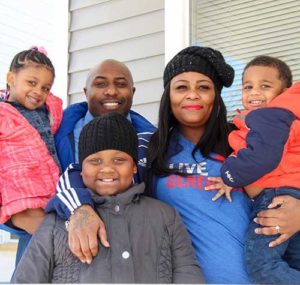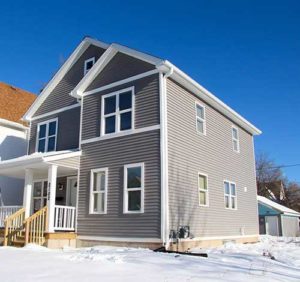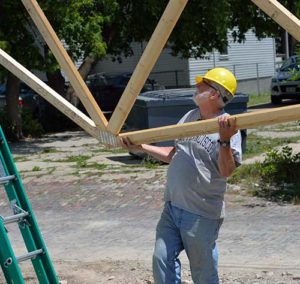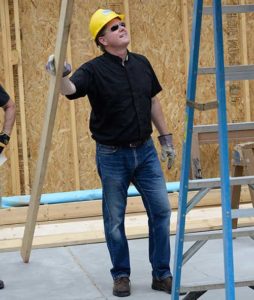MILWAUKEE — By the early afternoon hours of July 12, temperatures throughout Milwaukee were climbing through the mid-80s.
The heat was a fitting symbol for the heightened social tensions throughout the city and nation after a week of violence that included three fatal shootings in as many days in Baton Rouge, St. Paul and Dallas.

The Nation family, JohNelle, 4, LaBria, 8, Tiffany Nation and her fiancé Devin Pottinger, and JayCeon, 2, pose for a photo outside of their new house on Dec. 22. (Submitted photo courtesy Jake Brandt)
But in the face of the swelter and the specter of social unrest, seven men and women of God gathered at a Habitat for Humanity build site in Milwaukee’s Washington Park area, not just to perform a corporal work of mercy but also to send a message that there is no division between two groups of people – neither creed nor color nor neighborhood of origin – that cannot be bridged by the healing mercy of God.
The “senior pastor build,” as it was called by organizers, was the first of its kind in Milwaukee and took place at 2102 N. 39th St. The house built there is now home to Tiffany Nation, a bus driver and mother of three young children. The family moved in just days before Christmas. But it will also be a symbol of peace and understanding in a turbulent time.
Executive director of Milwaukee Habitat for Humanity Brian Sonderman described the build as “one day where leaders of the Christian faith community can come together and unite around something as profound and simple and important as the need for a decent place to live.”
“We couldn’t have predicted this (timing) several months ago when we came up with the concept of the senior pastor build,” he told the Catholic Herald. “I think it’s taken on, for me, an added meaning over the last couple of weeks as, nationally and even locally, we’ve seen so many examples of things that would divide us, that would tear us apart.”
Catholic, Lutheran, Presbyterian, Methodist and Evangelical pastors participated in the build.
An interfaith Habitat build represents a practical, hands-on ministry that “kind of puts things right,” during this difficult summer, said Fr. Tim Kitzke, archdiocesan vicar general for urban ministry, who participated in the build.
“I think what the city needs and what the church needs, more than anything, is a sense of unity and a sense of working together – that in our divergences and in our diversities, there’s more that unites us than divides us,” he said.
Build an outgrowth of Habitat mission
The idea for the senior pastor build grew out of Habitat for Humanity’s mission statement, said organizers – “seeking to put God’s love into action” by bringing people together for the purpose of building homes, communities and hope.
Sonderman said the sense of Christian unity emphasized by the pastor build is also fitting because “Milwaukee habitat was really birthed out of the local church … who came together back in the early 1980s to address the need for affordable housing,” he said.

The Nation family residence located on North 39th Street, Milwaukee, was constructed during the Habitat for Humanity’s senior pastor build. (Submitted photo courtesy Milwaukee Habitat for Humanity)
“Again, it was a group of Lutheran, Catholic, and other denominational leaders who came together and said, ‘you know, we’ve certainly got differences in theology and all sorts of things, but one of the things that we can agree upon is that everyone needs a decent place to live.’”
In enlisting pastors to participate, Habitat for Humanity Milwaukee reached out to a “cross-section of the Christian faith community,” said Sonderman – and Fr. Tim Kitzke, he said, was one of his first calls. Though Fr. Kitzke has been involved in the Habitat mission for some time via groups in his parishes — Three Holy Women, Ss. Peter and Paul and Old St. Mary — this was his first build experience.
“I’ve never done anything hands-on because I don’t have a handy bone in my body,” he said during a break in his work on the home’s garage. “I’m asking St. Joseph to give me some guidance and strength because to be honest with you, I don’t really know what I’m doing – but it’s a heck of a lot of fun.”
Priests reflect on ministry to central city
Fr. Kitzke admitted that he wasn’t only feeling out of his depth as a construction worker these days. Just a little over a year into his assignment as the vicar general in charge of urban ministry in the archdiocese, “I’m still on the learning edge of that,” he said. In that role, Fr. Kitzke works to establish priorities for the church to address within the urban community, provide formation on social justice issues and to identify ministerial concerns and gaps in services within urban neighborhoods.
“I feel like I learn something new every day,” he said. “But I guess the most important thing I’ve learned is that I don’t have to do it myself…. My job is to get people to work together more and more. I’m discovering that that’s the real key.”
He is encouraging parishes to integrate Habitat for Humanity into their social justice ministry, hoping to “shine the Catholic light and say that this is an important part of our tradition.”
“It’s practical, but it’s also very powerful,” he said of the work Habitat does. “I can tell you the Holy Spirit is right here.”
Fr. Kitzke was not the only representative of the Catholic Church at the build; he was joined by Fr. Bob Stiefvater, pastor at All Saints and St. Martin de Porres parishes. As a pastor in the central city, Fr. Stiefvater said the shootings and protests of last summer have been weighing heavily on his mind. He said he is calling on his congregation to pray, but also wants to develop an action plan to combat the underlying agencies of the violence and turmoil.

Fr. Bob Stiefvater, pastor of All Saints Parish, Milwaukee, contributes his strength to some heavy lifting during the senior pastor build on July 12. (Catholic Herald photo by Peter Fenelon)
“We have to take a serious look at youth issues and how to engage our youth in society,” he said, naming conscience and values development as key, as well as “forming adults in the Catholic faith so that they are capable of transmitting it to their children.”
“You have to have a stable neighborhood to create a stable parish, because parishes are built on a long-term formation program,” he said. “If you have people moving every year or every six months or every two years, you can’t have that. If we’re going to be helping adults raise their children, we need to have … affordable and safe housing, we need to have a good employment base that provides a living wage for families.”
And that’s where partner groups like Habitat come in, he said: “We can’t do this alone in the central city…. I know Habitat is winding up in the Sherman Boulevard area and is looking to move to a whole new area in 2017. I really hope it moves into one of the parishes that I’m responsible for or that I collaborate with as an inner city parish, because I really think we’re ready to take advantage of something like this.”
Build funded by Thrivent partnership
The July build was funded by Thrivent Builds With Habitat for Humanity, a multi-year, multi-million dollar advocacy and homebuilding partnership between Habitat for Humanity International and Thrivent Financial, a Christian-based financial services non-profit headquartered in Minneapolis and Appleton.
The Thrivent Builds program was launched in 2006 with a four-year, $105 million commitment to Habitat for Humanity. After subsequent program renewals, Thrivent, its employees and members have given over 4.7 million volunteer hours and $226 million to the construction, rehabilitation and repair of homes throughout the world. In Milwaukee alone, more than 50 houses have been built through the Thrivent Builds program.
Thrivent CEO Brad Hewitt said the partnership with Habitat is a natural extension of the company’s mission – “helping people be wise with money and live generously.”

Fr. Tim Kitzke, archdiocesan vicar general for urban ministry, watches as work is being done during the senior pastor build on July 12. (Catholic Herald photo by Peter Fenelon)
“One of the things about living generously is … it actually helps them be wise with money, and to be wise with money means you’re living generously,” he said.
“Our job today is just to give people an opportunity to serve, and what we know is that as they do that, they will … be a role model then for some of the people in their parish.”
Sonderman said he expects new partnerships will come from the connections made at the build, which can serve as “a springboard for future projects that will provide a greater amount of hope in our community.”
“Just watching the pastors greet one another, introduce themselves to each other; I saw a lot of cards being exchanged, a lot of ‘I’d like to get together and talk more over coffee,’” he said. “I think out of the outgrowth of what happens today are new relationships and new partnerships potentially that can be formed to address the great needs that exist in our city. And that, to me, is incredibly hopeful and incredibly exciting, and if Habitat can be a part of something significant like that, then it’s so much bigger than one house.”
